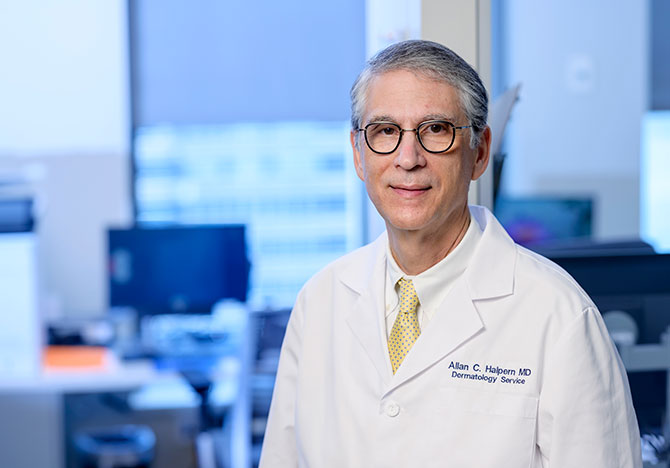Transforming Early Detection in Melanoma at MSK and Honoring a Legacy
Graham and Howard's Fight
Dr. Peter S. was the kind of physician that patients trusted implicitly for an accurate diagnosis, and they often sought his opinion even after he retired.
When Dr. S. fell at age 87 and was taken to the emergency room, his two sons Graham and Howard found him completely alert to a physician’s questions. But two days later, Dr. S. could barely speak. The diagnosis: a brain tumor.
Through genetic testing that can analyze tumor DNA, the S's learned that the brain malignancy was a secondary cancer. The primary disease was melanoma, the most serious of skin cancers. It had metastasized to Dr. S’s brain and lungs.
Ironically, years earlier it was Dr. S.'s who had noticed an unusual mole on Graham’s skin. His astute observation led to a diagnosis of early-stage melanoma and immediate treatment for his son.
In Dr. S’s case, there had been no prior sign that he was ill. The specialists did all they could, but the disease had progressed undetected for too long. Dr. S. died a few months later.
The Importance of Early Detection
Dr. S. had always impressed upon his family the importance of an early diagnosis. His sons, because of their family history, made regular appointments to have their skin checked for cancer. During a trip to New York City, Howard realized he was overdue for a skin check. The physician took a biopsy of a suspicious mole, which was diagnosed as stage I melanoma. Since it was discovered early, the cancer was easily removed. Howard, like Graham, was fortunate.
Howard had been referred to Memorial Sloan Kettering Cancer Center (MSK) where he met Allan Halpern, MD, Chief of the Dermatology Service. “I knew the moment I met him that I wanted to stay under his care, even though I don’t live in New York,” says Howard. “Dr. Halpern is a wonderful doctor, and MSK is an exceptional institution.”
MSK developed the very first drug to improve the lives of people with metastatic melanoma. It was approved by the FDA in 2011. But additional investment is essential to continue improving early detection of skin cancers, which is the core of Dr. Halpern’s work. The five-year survival rate of people with local stage I melanoma is 99%. For melanoma that has spread to distant organs, it is 27%.
An Innovative Approach
Dr. Halpern’s pioneering research makes use of whole-body photography to assist physicians in identifying cancerous moles when they are most treatable. He shared with the S. brothers a program he is developing to apply artificial intelligence (AI) to skin imaging. It would enable anyone with a smartphone to proactively monitor their skin.

Howard and Graham were inspired by Dr. Halpern’s early adoption of technology and collaborative approach with researchers at medical centers across the globe. They generously decided to fund the program, known as the International Skin Imaging Collaboration (ISIC), through the S. Family Fund.
The Impact of Giving
The brothers’ philanthropic partnership with MSK supports the development of an online database of skin images, which will foster the creation of AI algorithms needed to identify melanoma in its earliest forms.
“The holy grail,” says Graham, “is an AI-enhanced image that allows the physician to determine if a biopsy is necessary.” The siblings hope that their giving to the ISIC project will help accelerate the availability of this life-changing technology at cancer centers throughout the United States and other countries.
Howard and Graham are committed to remembering their father by supporting Dr. Halpern’s initiative. “At its core, MSK is an amazing institution with forward-thinking research and old-fashioned values,” says Howard. “Like our father, the doctors and all the personnel will always put the patient first.”
Advance MSK Breakthroughs With a Gift
You can join Graham and Howard by making a gift to help Memorial Sloan Kettering further early detection and treatments for all cancers. Contact the Office of Gift Planning at giftplanning@mskcc.org or 800-688-1827 to learn more about how you can make a difference.